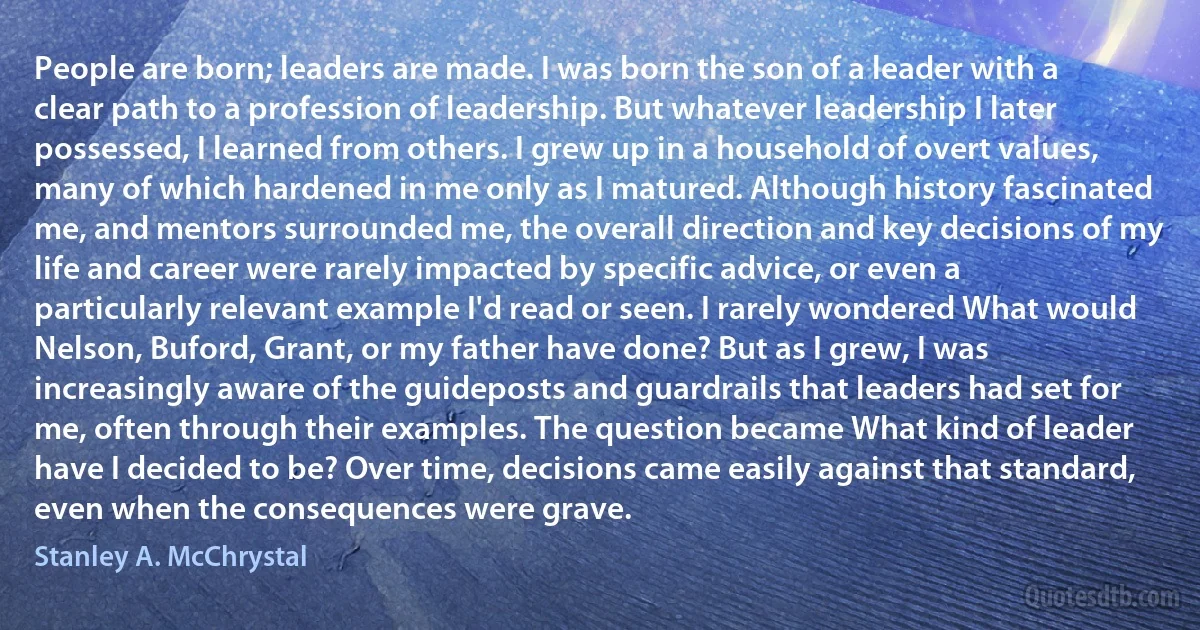Household Quotes - page 14
His superiority was, indeed, real and incontestable; he was the classical ornament of the anti-slavery party; their pride in him was unbounded, and their admiration outspoken.The boy Henry worshipped him, and if he ever regarded any older man as a personal friend, it was Mr. Sumner. The relation of Mr. Sumner in the household was far closer than any relation of blood. None of the uncles approached such intimacy. Sumner was the boy's ideal of greatness; the highest product of nature and art. The only fault of such a model was its superiority which defied imitation. To the twelve-year-old boy, his father, Dr. Palfrey, Mr. Dana, were men, more or less like what he himself might become; but Mr. Sumner was a different order - heroic.

Henry Adams
To emancipate woman is not only to open the gates of the university, the law courts, or the parliaments, for her, for the "emancipated" woman will always throw domestic toil on to another woman. To emancipate woman is to free her from the brutalizing toil of kitchen and washhouse; it is to organize your household in such a way as to enable her to rear her children, if she be so minded, while still retaining sufficient leisure to take her share of social life.
It will come to pass. As we have said, things are already improving. Only let us fully understand that a revolution, intoxicated with the beautiful words Liberty, Equality, Solidarity would not be a revolution if it maintained slavery at home. Half humanity subjected to the slavery of the hearth would still have to rebel against the other half.

Peter Kropotkin
Since it is always the same person whose mind thinks, wills, and judges, the autonomous nature of these activities has created great difficulties. Reason's inability to move the will, plus the fact that thinking can only "understand” what is past what neither remove it nor "rejuvenate it” ... have led to the various doctrines asserting the mind's impotence and the force of the irrational, in brief to Hume's famous dictum that "Reason is and ought only to be the slave of the passions,” that is, to a rather simple-minded reversal of the Platonic notion of reason's uncontested rulership in the household of the soul. What is so remarkable in all these theories and doctrines is their implicit monism, the claim that behind the obvious multiplicity of the world's appearances and, even more pertinently to our context, behind the obvious plurality of man's faculties and abilities, there must exist a oneness - the old hen pan, "the all is one” - either a single source or a single ruler.

Hannah Arendt
For he is our peace, who hath made both one, and hath broken down the middle wall of partition between us; Having abolished in his flesh the enmity, even the law of commandments contained in ordinances; for to make in himself of twain one new man, so making peace; And that he might reconcile both unto God in one body by the cross, having slain the enmity thereby: And came and preached peace to you which were afar off, and to them that were nigh. For through him we both have access by one Spirit unto the Father.
Now therefore ye are no more strangers and foreigners, but fellow citizens with the saints, and of the household of God; And are built upon the foundation of the apostles and prophets, Jesus Christ himself being the chief corner stone; In whom all the building fitly framed together groweth unto an holy temple in the Lord: In whom ye also are builded together for an habitation of God through the Spirit.

Paul

